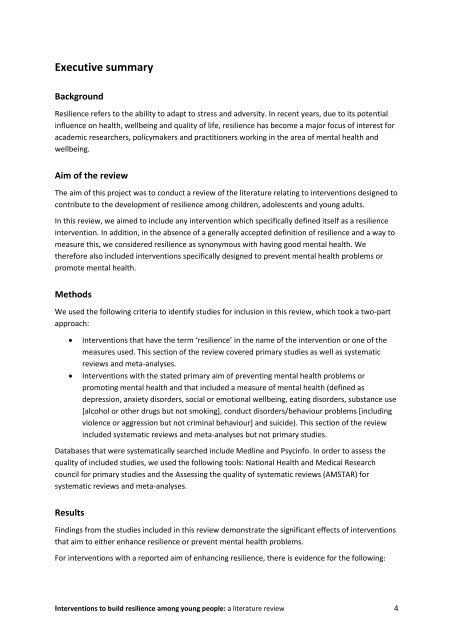Interventions to build resilience among young people A literature review
Interventions-to-build-resilience-among-young-people
Interventions-to-build-resilience-among-young-people
You also want an ePaper? Increase the reach of your titles
YUMPU automatically turns print PDFs into web optimized ePapers that Google loves.
Executive summary<br />
Background<br />
Resilience refers <strong>to</strong> the ability <strong>to</strong> adapt <strong>to</strong> stress and adversity. In recent years, due <strong>to</strong> its potential<br />
influence on health, wellbeing and quality of life, <strong>resilience</strong> has become a major focus of interest for<br />
academic researchers, policymakers and practitioners working in the area of mental health and<br />
wellbeing.<br />
Aim of the <strong>review</strong><br />
The aim of this project was <strong>to</strong> conduct a <strong>review</strong> of the <strong>literature</strong> relating <strong>to</strong> interventions designed <strong>to</strong><br />
contribute <strong>to</strong> the development of <strong>resilience</strong> <strong>among</strong> children, adolescents and <strong>young</strong> adults.<br />
In this <strong>review</strong>, we aimed <strong>to</strong> include any intervention which specifically defined itself as a <strong>resilience</strong><br />
intervention. In addition, in the absence of a generally accepted definition of <strong>resilience</strong> and a way <strong>to</strong><br />
measure this, we considered <strong>resilience</strong> as synonymous with having good mental health. We<br />
therefore also included interventions specifically designed <strong>to</strong> prevent mental health problems or<br />
promote mental health.<br />
Methods<br />
We used the following criteria <strong>to</strong> identify studies for inclusion in this <strong>review</strong>, which <strong>to</strong>ok a two-part<br />
approach:<br />
<br />
<br />
<strong>Interventions</strong> that have the term ‘<strong>resilience</strong>’ in the name of the intervention or one of the<br />
measures used. This section of the <strong>review</strong> covered primary studies as well as systematic<br />
<strong>review</strong>s and meta-analyses.<br />
<strong>Interventions</strong> with the stated primary aim of preventing mental health problems or<br />
promoting mental health and that included a measure of mental health (defined as<br />
depression, anxiety disorders, social or emotional wellbeing, eating disorders, substance use<br />
[alcohol or other drugs but not smoking], conduct disorders/behaviour problems [including<br />
violence or aggression but not criminal behaviour] and suicide). This section of the <strong>review</strong><br />
included systematic <strong>review</strong>s and meta-analyses but not primary studies.<br />
Databases that were systematically searched include Medline and Psycinfo. In order <strong>to</strong> assess the<br />
quality of included studies, we used the following <strong>to</strong>ols: National Health and Medical Research<br />
council for primary studies and the Assessing the quality of systematic <strong>review</strong>s (AMSTAR) for<br />
systematic <strong>review</strong>s and meta-analyses.<br />
Results<br />
Findings from the studies included in this <strong>review</strong> demonstrate the significant effects of interventions<br />
that aim <strong>to</strong> either enhance <strong>resilience</strong> or prevent mental health problems.<br />
For interventions with a reported aim of enhancing <strong>resilience</strong>, there is evidence for the following:<br />
<strong>Interventions</strong> <strong>to</strong> <strong>build</strong> <strong>resilience</strong> <strong>among</strong> <strong>young</strong> <strong>people</strong>: a <strong>literature</strong> <strong>review</strong> 4


